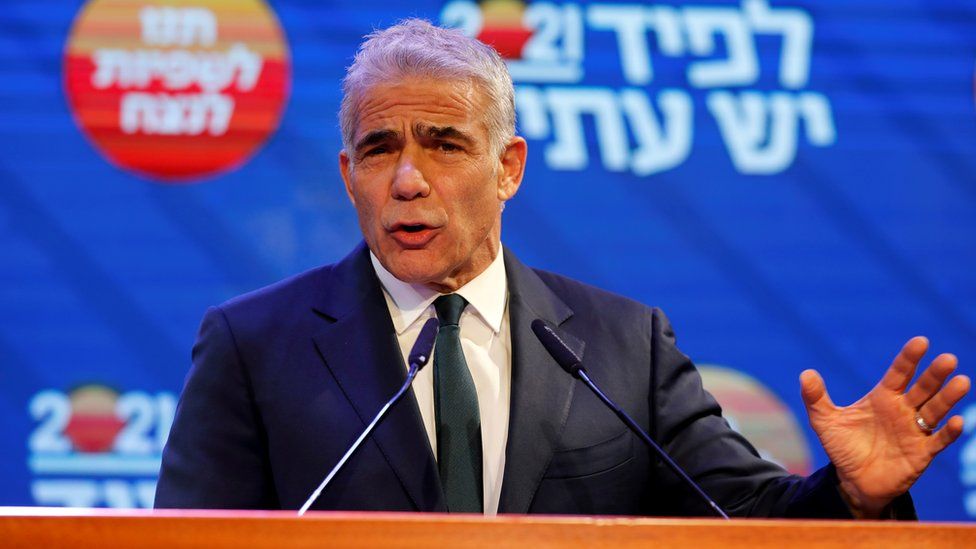Israeli PM Benjamin Netanyahu could struggle to secure enough seats in parliament to stay in power, incomplete results from Tuesday’s election show.
With almost 90% of votes counted, his right-wing bloc is on course to win 59 seats – two short of the threshold.
In a surprise development, an Arab party which is projected to get five seats could hold the balance of power.
The final outcome will among other things determine the course of Israel’s relations with the Palestinians.
The Arab party, Raam, has not declared whether it will support the efforts of Mr Netanyahu – an unnatural ally – to form a governing coalition or those of the bloc of parties opposed to him remaining in office.
They are projected to win 56 seats, according to the latest tally, and although backing from Raam could give them a majority, they are fragmented and unlikely to be able to agree to work together.
If neither bloc succeeds, the country could face its fifth election since 2019.
What do the partial results show?
Israel’s electoral system, a form of proportional representation, makes it almost impossible for a single party to win an election outright.
According to the Central Election Commission, the prime minister’s right-wing Likud party has won 24.2% of the vote so far and the centrist Yesh Atid party of the main opposition leader, Yair Lapid, is second with 13.9%.
Israeli media reported that the tallies would result in Likud getting 30 seats in the 120-seat Knesset and Yesh Atid 17.
The ultra-Orthodox Jewish parties Shas and United Torah Judaism were projected to get nine and seven seats respectively; the centrist Blue and White party of Defence Minister Benny Gantz eight; the centre-left Labour party and the nationalist Yamina and Yisrael Beitenu parties seven each.
The Joint List alliance of Arab parties, the New Hope party of Mr Netanyahu’s former Likud ally Gideon Saar and the far-right Religious Zionism alliance are forecast to win six each; and the left-wing Meretz party and Raam five apiece.
Who could tip the balance?
The final election results are not due until later this week, but it appears that both Mr Netanyahu and his rivals will require the support of Yamina and Raam to secure a majority.
Raam split from the Joint List earlier this year in part because its leader Mansour Abbas said he was open to working with Mr Netanyahu to address the needs of Israel’s Arab citizens, who make up about 20% of the population.
In an interview on Wednesday morning, Mr Abbas said he would not rule out joining any coalition.
“We are not in anyone’s pocket. We are prepared to engage with both sides,” he told Israel’s 103 FM radio station.

Mr Netanyahu would also need to partner with Yamina leader Naftali Bennett, a former protégé and defence minister with whom he has a difficult relationship.
Like Mr Abbas, Mr Bennett has not announced which side he will throw his weight behind.
“I will do only what is good for the State of Israel,” he said after voting ended on Tuesday night.
Yamina would await the final results before deciding, he added.
How have Mr Netanyahu and his rivals reacted?
After exit polls were released on Tuesday night, Mr Netanyahu claimed “a huge win to the right and Likud under my leadership” on social media.
But in a later speech at Likud’s election headquarters, he only said that the party’s projected total was “a great achievement” and that the country needed a “stable government”.
“This is what the challenges we are facing require. And we must not drag the state of Israel to a new election,” he added.

Mr Lapid declared that he was “proud” of Yesh Atid’s “enormous” achievement.
“I have already begun this evening to hold talks with some of the leaders of the bloc for change and will continue in the next few days,” he said, adding that he would “do everything possible to establish a sane government in the State of Israel”.
What were the key campaign issues?
The election was widely seen as a referendum on Mr Netanyahu’s leadership.
The 71-year-old prime minister has been in power continuously since 2009, having served an earlier three-year term in the late 1990s.
His campaign focused on Israel’s world-leading Covid-19 vaccination programme and his diplomatic success in normalising ties with some Arab countries.https://emp.bbc.com/emp/SMPj/2.39.19/iframe.htmlmedia captionThe BBC’s Tom Bateman spent 2020 following the lives of Israelis affected by the pandemic.
But his opponents from across the political spectrum accused him of mishandling the pandemic and argued that he should not remain in office while standing trial on corruption charges. He denies any wrongdoing.
After the previous three elections neither Mr Netanyahu nor his rivals were able to form a stable governing coalition.
The current national unity government, which was the result of a power-sharing deal with Defence Minister Benny Gantz, collapsed in December after just seven months.

